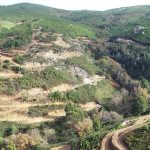Environmentalists condemn “unchecked spread” of olive tree plantations in Alentejo
Environmentalists in Portugal have warned that irrigated olive plantations with up to 2,500 trees crammed into one hectare, and have a lifespan of one or two decades instead of hundreds of years, risk uprooting a way of life and tradition that goes back to Ancient Roman times.
These monoculture plantations use highly productive dwarf varieties adapted to mechanisation, achieving very high yields. However, they rely on irrigation, heavy machinery and agrochemicals, which lead to soil erosion and biodiversity loss.
“Across the Alentejo, the uniform hedgerows of olives stretch as far as the eye can see. The area’s irrigated plantations have expanded rapidly in the last two decades with the supply of water from the Alqueva reservoir, the largest artificial lake in Western Europe” reports Euronews.
Built with public funds, the reservoir was designed to bring economic growth to one of the continent’s poorest and driest regions. But the irrigation has mostly benefited large corporate groups profiting from super-intensive olive plantations.
According to the company that manages the reservoir, EDIA, 80% of the water in it is used to irrigate the Alentejo’s almond and olive groves.
While Alqueva’s irrigation system and intensive olive plantations have been very profitable for investors in the short term, there are growing concerns about the environmental costs.
Scientists and environmentalists have warned that intensive olive farming in southern Portugal is transforming a once diverse landscape into monotonous rows of intensive plantations, damaging ecosystems and contaminating water and soil with agrochemicals.
For many, the current trajectory is unsustainable in a region increasingly affected by drought and extreme weather events.
A study by the consulting firm Agrogés predicts that climate change will increase water demand for irrigated olive groves by 5 per cent to 21 per cent, while average annual inflows to the Alqueva reservoir are expected to decrease by 5 per cent to 10 per cent by 2050.
Teresa Pinto Correia, a professor at the University of Évora who specialises in rural landscapes warns: “We won’t have enough water” and fears that the simplification of ecosystems in homogeneous landscapes will make the region even more vulnerable to climate change.
Source: Euronews: https://www.euronews.com/green/2025/04/13/an-ecocide-how-olive-oil-giants-are-using-a-mega-dam-to-take-over-portugals-growing-region










